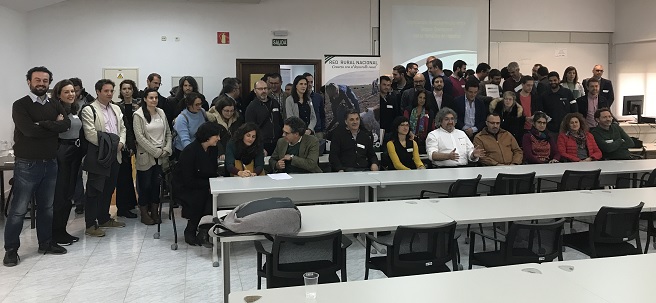
17 de February de 2020
February 14, 2020. On February 13, at the National Rural Network (CENCA), the National Rural Network (RRN) organized a day of experience exchange between Operational Groups focused on irrigation. More than 60 participants participated, representing diverse backgrounds related to innovation in this area and from different autonomous communities. The knowledge transfer took place in thematic work rooms, where projects at different stages converged, comparing their progress and gathering ideas for replication in other territories. The day concluded with a visit to the National Center for Irrigation Technology (CENTER).
At the inauguration, María Fernández, Deputy Director General of Irrigation and Rural Infrastructure of the Ministry of Agriculture and Fisheries , MAPA, and Jesús López Tapia , also from this Deputy Directorate General, detailed the main areas of work of the National Center for Irrigation Technology ( CENTER ), where one of its main tasks is the standardization of irrigation equipment and materials .
Next, Jorge Cuevas , from the General Subdirectorate of Rural Environment Promotion of the MAPA, explained what activities the RRN carries out in relation to innovation and how the dissemination of information and results from the Operational Groups (GOs) is promoted , in addition to describing other functions of the RRN in relation to the development of the rural environment .
Carlos Garrido , representing the Subdirectorate General for Innovation and Digitalization of the MAPA, focused on the context of innovation at the European level and the support provided by the MAPA , in this case through GO projects, to accelerate the innovation process, boost productivity in the agri-food and forestry sectors, and minimize environmental impact . Garrido reviewed the progress of the various calls for innovation grants from the European Innovation Association. ( AEI-AGRI), in the PNDR 2014-2020 and the 5% percentage that represents the creation of GOs in irrigated areas , in submeasure 16.1 of the 2016 and 2018 calls.
The MAPA 's Subdirectorate General for Innovation and Digitalization has sought to celebrate this event, organized by the RRN at the National Center for Agricultural Training ( CENCA ) , located in the “El Palomar” farm, show updated information on innovation projects designed by the AEI -AGRI GOs .
Work rooms by topic
The more than 60 people attending the event, with a diverse professional profile in terms of activity (companies, technicians, administrations, agricultural organizations, farmers, etc.) and originating from practically the entire country , have shared information about their GOs and/or Innovation Projects.
By comparing the problems and the solutions provided, they have transferred the results obtained in the development of each of them, which has allowed for the generation of synergies, despite the fact that the projects have participated in different phases, but have shown their progress and collected ideas to transfer between them .
The GOs were divided into four parallel work rooms, each one focused on farm technologies . Various projects were shared: intelligent thermography control for woody crops, the water footprint protocol for horticulture, increased irrigation efficiency, and fertilization of citrus fruits through a comprehensive management service ; and a thematic network for applying new technologies to vineyard irrigation systems . The main conclusion of the work group was that new technologies are adapted to the real needs of farmers and irrigators .
In the second room, on resource optimization , the following projects were presented: application of machine learning techniques for irrigation management in horticulture , systems integration for a single global irrigation and fertilizer management platform , a knowledge transfer network for water reuse for agriculture , and evapocontrol techniques . In this room, participants expressed the great usefulness of the support received from European funds, EAFRD and Horizon 2020 for cooperation, in the development of their projects .
The third addressed energy efficiency in irrigation , introducing solar irrigation technology , the control of reclaimed water for agricultural use , water and energy savings in hydroponic crops , and the creation of a market for clean energy generated by and for the irrigators themselves . The development status of each project allowed for a comparison of the degree of progress and the possibility of applying them to other areas .
Higher-level management was the focus of the discussion in the fourth breakout room. There, participants discussed an example of water partnership in a river basin , knowledge transfer in 2.0 irrigation innovation , integrated water management , and an advanced precision agriculture service for cooperatives . The most important conclusions from this room focused on the continuity of the GOs to address the continuity of the projects: how it continues, who continues, and how public-private collaboration mechanisms are established to allow for replication of the projects in the region.
To close the day, it was combined with a visit to the CENTER , which brought together R&D&I activities and the development of new equipment and testing procedures , both tasks closely linked to the standardization of irrigation equipment and materials , which is one of the areas in which the CENTER specializes. All the work carried out is made known through significant communication and transfer of knowledge and R&D&I results .
A list of the Operational Groups that participated in the event can be found by clicking here .











